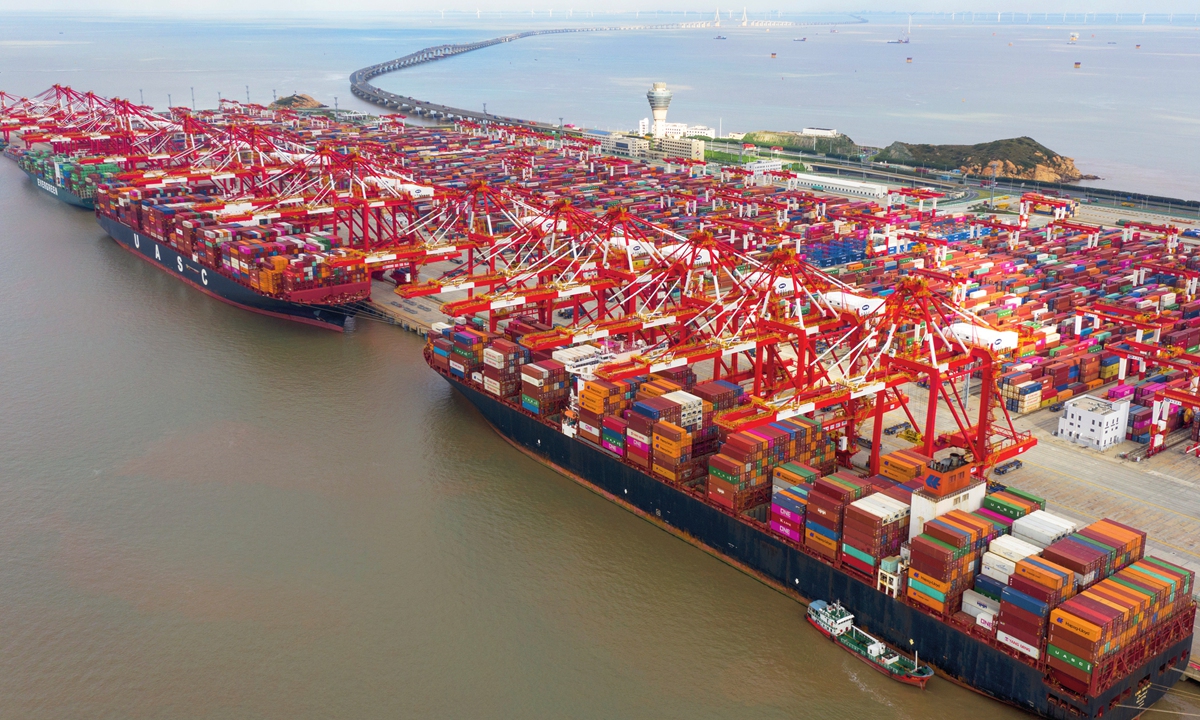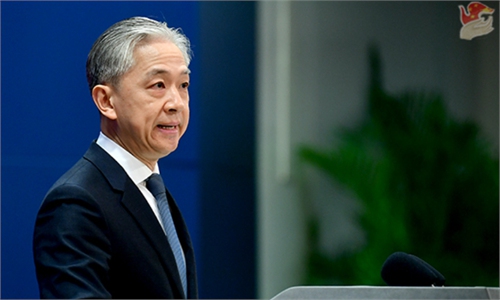If Italy withdraws from BRI hastily, it will damage Italy's image, credibility, and cooperation: ambassador

Containers carrying goods for the third China International Import Expo wait at Yangshan port in Shanghai on Sunday. The port has welcomed its peak season as the fair approaches, and thousands of items for the exhibition from countries such as Finland, Italy and Germany have entered the port. Photo: cnsphoto
If Italy chooses to withdraw from the Belt and Road Initiative (BRI), a platform that demonstrates the political mutual trust and strategic cooperation with China, it will have a negative impact on Italy's image, credibility, and cooperation, the Chinese Ambassador to Italy, Jia Guide, said.
Jia made the remarks during an interview with Italian news outlet Fanpage on Friday amid speculations that the Italian government is considering to withdraw from the initiative.
China and Italy signed a memorandum of understanding (MOU) to jointly advance the construction of the Belt and Road in March 2019, the Xinhua News Agency reported.
Italy became the first and, so far, the only G7 nation to sign a four-year contract with the initiative, which is set to be renewed automatically for another five years in March 2024 if neither side withdraws by giving three months' notice.
Meanwhile, Italy hesitates to renew the BRI contract, as Italian Prime Minister Giorgia Meloni said in May that good relations with China are possible even without being a part of the BRI.
The BRI is the result of the long-term mutual respect and win-win results between the two countries. It is also the strategic sublimation of the friendship and practical cooperation that have been built over the years. Its significance includes not only the economic level, Jia said.
When countries around the world are "stepping on the gas pedal" in cooperation with China, "stepping on the brakes" and "engaging the reverse gear" are obviously not good options that are in the interests of the two countries, Jia said.
After the signing of the MOU, the strategic level of China-Italy relations has been further enhanced, resulting in many direct and indirect positive effects, Jia said.
Data showed that the bilateral trade volume between China and Italy has repeatedly hit new highs during the past four years.
From 2019 to 2022, bilateral trade increased by nearly 42 percent. In 2022, it reached nearly $78 billion. Italy's exports to China increased by 42 percent from 2019 to 2021.
The first large cruise ship jointly built by the two countries was launched in Shanghai recently, and there will be five more in the future, at a total cost of $5 billion. A joint venture of Italian and French semiconductors in China had a total price tag as high as $3.2 billion.
In four years, there have been seven agreements signed on Italian products exported to China, and the volume and speed of access ranked top among European countries.
Besides, Italy has become the most popular tourist destination among European countries for Chinese tourists, and the number of international students in Italy has risen to 29,000.
A large number of cooperation results and benefits are by no means taken for granted, but are inseparable from the positive public opinion atmosphere and cooperation expectations after the signing of the MOU, Jia said.
The MOU is a mutually beneficial cooperation document, not a gift from one side to the other, Jia stressed.
This year, the two countries should take back the three-year delay of the epidemic, talk about more cooperation and do more things well, so that the people of the two countries can truly feel the benefits brought about by cooperation, Jia said.
For a platform that demonstrates mutual political trust and the strategic level of cooperation between the two sides, if Italy decides to withdraw from the BRI hastily, it will undoubtedly send a negative signal and "pour cold water" on cooperation in various fields such as politics, the economy, trade and culture between the two countries, and will also damage the image of the country, its credibility, and expectations of cooperation, Jia said.
China is an irreplaceable partner and development opportunity not to be missed, he said.
Italy, as well as some other countries in Eastern Europe, usually holds a pragmatic policy in its cooperation with China. But a worsening geopolitical environment and the US' spread of the "China threat" theory have made it increasingly difficult for the countries in the region to promote cooperation with China, said Chinese experts.
Commenting on whether G7's "de-risking" strategy leads to Italy not to renew the MOU, Jia said de-coupling has been proven to violate economic laws and the international economic and trade order, and is impossible to achieve.
It is even more important to see who is engaging in trade wars, abusing economic and financial hegemony, disrupting the global trade order and the process of economic recovery and creating real risks, Jia said.
The year 2024 marks the 20th anniversary of the establishment of the China-Italy comprehensive strategic partnership. It is hoped that the two sides will seize the opportunity, accommodate each other's core interests and major concerns and jointly promote the steady and long-term development of bilateral relations, Jia said.
Global Times



